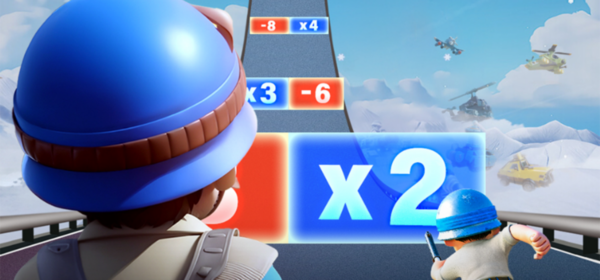"Literally everything can be stolen here": a big thread about the device of the hyper-casual market
Indie artist and developer George Zarkua wrote a big thread on his Twitter page about the structure of the hyper-casual games market. He spoke about the history and development of the genre, relations with publishers, filling the market with money and the trend towards wholesale borrowing of other people’s ideas. We share material based on motives.

How it all started
Zarqua considers the success of Flappy Bird to be the starting point, after removing it from the store, people began selling phones with the game installed at exorbitant prices. “Yes, farting apps have always been popular, but a portal to hell was opened 7 years ago,” the artist writes.
The next stage Zarqua highlights release 2048, which was, in fact, a free and simplified clone of Threes. The authors received huge traffic and founded the Ketchapp publishing house.
3. They released new games, apple fixed them + a small redirection of traffic from their other games, and so each release occupied a place in the top for a couple of weeks. The snowball of users grew very quickly. The games were very simple and at the same time very successful. pic.twitter.com/BuocNNUc1S
— Zarkua (@artzarkua) February 16, 2021
As Zarqua notes, publishers then did not look at specific indicators, but took games based on their intuition. At the same time, only three people initially considered all applications in Ketchapp. “It was enough to write a letter, and now they are signing a publishing contract with you,” the artist recalls.
The main difficulty was that a small circle of people had to manually read reviews, check bugs, and inspect prototypes. All this was done through Hangouts, which eventually led to a huge queue of people wanting to release their games.
7. Because of this queue, a large number of developers with fully finished products were formed, but they were forced to move pixels on the icon for weeks, just to occupy them with something before the calendar release. And obviously you can always fuck up.
— Zarkua (@artzarkua) February 16, 2021
Separately, Zarqua recalls the cross-promo, which at that time was just two text files on the publisher’s server with the serial numbers of projects. “That is, your game comes out and it is placed 11th in the list. This means if a person plays some other game of theirs, then on the 11th advertisement he will see yours. It’s about half an hour later,” the artist explains.
This approach often led to a large number of failures. Some games that the publisher did not believe in suddenly took off, and the authors of successful projects, on the contrary, could not re-create another hit.
12. All these events happened so quickly and smoothly that you signed a contract on some conditions, and received a release on completely different ones. Also, the appearance of “druzhbans” from the category of hitmakers led to the fact that after the loss of the feature and traffic, the company began to deflate.
— Zarkua (@artzarkua) February 16, 2021
During this time, Zarqua managed to publish two games, both of which are Utopia publishers. “One of them has sunk into oblivion, having received a not very solid five-digit. And the second one started from high positions, but almost immediately fell due to low indicators,” he recalls.
Changes in Google Play algorithms
The shake-up in the hyper-casual market happened after Google suddenly “rearranged something somewhere”. As a result, 98% of the games were rearranged and stopped receiving traffic.
15. If at that time you would have visited any publisher on the page, you would have seen applications ranked according to some Google algorithms. In practice, this led to this: in whatever application of this publisher you would not have entered, you were recommended as “similar” games in this order. pic.twitter.com/bIkCC1OWGC
— Zarkua (@artzarkua) February 16, 2021
This played into the hands of Zarqua, whose game began to be recommended in hundreds of applications as similar. “This has led to millions of trailer views, tens of millions of horse races, and a very pleasant monthly passive income,” he says of the unexpected success.
18. As a result, we were offended that the publisher didn’t do a fucking thing and takes a fat percentage for himself, the publisher was offended that it wasn’t what they wanted in the recommended ones and we both looked something like this pic.twitter.com/GSY4DqAiUY
— Zarkua (@artzarkua) February 16, 2021
Long queues and the Chinese App Store
On the wave of success, Zarqua recalls how he and the team made an update for the game to maintain interest in it. However, the publisher published it only two years later.
In anticipation of the release of the update, Zarqua continued to make content for the game, while doing several more projects at the same time. The team gave a couple of titles to another publisher, but they did not bring money at all.
20. It is worth noting that at that time I was sensitive to everything I did, so all those months that we were waiting for the release of games, I just sawed the content into the game. Animated buttons, hundreds of animations of cards and kilograms of different transitions. As an example of one of the hundreds: pic.twitter.com/99bm8pHQ8U
— Zarkua (@artzarkua) February 16, 2021
Everything changed when one of the projects, Rooster Rumble, suddenly earned about a thousand dollars in a day. It turned out that the reason was the users of the Chinese App Store, the existence and potential of which many developers did not suspect at that time.
23. So I found out that in China there is also an apl store, and there is also a year of the rooster and the game about the pussy of roosters suddenly took off. The original name “cock fight” for which I loved this game, I was forbidden to use, so enjoy my trailer with a different name. pic.twitter.com/kR4QIc0ZrU
— Zarkua (@artzarkua) February 16, 2021
The arrival of big money and the beginning of the “stage of indicators”
As soon as the hyper-casual market stabilized, “big uncles” came to it with serious money. They created entire departments and took games solely on the basis of indicators. “It was the Stalingrad of the hyperkage world for publishers who ranked three through a notebook,” Zarqua recalls.
As a result, the old publishers were unable to adapt and scale to the changed market. According to the artist, a new “stage of indicators” began at the same time.
28. While all sorts of Goldman Sachs and tensents INVESTED in the publisher Vilaribo, the publisher Vilabajo was bought at a red price tag. A new stage has come. The stage of indicators. This means that it doesn’t matter what the game is about, what it is and how it looks. If it can be milked, it needs to be milked.
— Zarkua (@artzarkua) February 16, 2021
The main indicators for evaluating the success of projects were CPI and retention. The ads were tested in the USA exclusively on iOS, the rest were classified as “insolvent”.
“This has led to the fact that the market has adjusted to the user’s taste. 99.5% of games did not pull out indicators. Those that were pulled out were immediately mercilessly cloned,” explains Zarqua.
33. The funny thing is that due to the fact that the development turned into a pretentious pipeline, developers in search of ideas cloned everything in a row: gifs from Instagram, mechanics from old games, mechanics from paid games. For this, publishers could not be sued. But if cloned from them! pic.twitter.com/J6KSPgH7jt
— Zarkua (@artzarkua) February 16, 2021
The Era of plagiarism and borrowing
“Literally everything can be stolen in a hypercasual,” Zarqua explains. It’s not just about mechanics and visual style, but even about conference texts.
35. Our prototype was aborted at the production stage so that the ouroboros from the hypercausal did not eat itself and the traffic was from different mechanics. Another game came out and feels good. By the way, at the time of its release, it looked EVEN worse than this one. pic.twitter.com/e7j6voktej
— Zarkua (@artzarkua) February 16, 2021
36. The second story. We made a game and literally a week later it was unpacked and stolen by an office from our city. I changed assets a little bit, tweaked something and released it. But the game did not give the necessary indicators for us and them, so the guys wasted their time.
— Zarkua (@artzarkua) February 16, 2021
Zarqua recalls how then they came up with the idea of making technological, but at the same time simple games. They began to pay more attention to physics and hoped that this would give them at least some head start in time.
41. Development of liquid shaders, rope physics, color mixing. My programmer was crying into the phone, I was crying into the pillow. pic.twitter.com/P7wN36LbVs
— Zarkua (@artzarkua) February 16, 2021
This approach had a downside — publishers refused to accept their games, because they were afraid that players simply would not believe in their truthfulness. “Dude, the trailers are too beautiful, people don’t believe that it’s not fake and that they can be installed,” Zarqua heard about these words.
At the same time, individual publishers appeared who “laundered traffic”, driving almost any game into the top. This complicated the assessment of the market and did not allow us to say exactly what the audience liked.
Zarqua recalls that he managed to cooperate with many publishers. However, at some point one thing became obvious — no one would give money for a difficult game or a risky game, no matter what unique idea it was based on.
51. We stubbornly squeezed everything out of ourselves. We tried to make games with raw beta versions of future assets. Here, for example, is the physics of tissues. There is not yet a single game in the GC genre with normal tissue physics. But the indicators are such that it looks like it won’t. pic.twitter.com/Pydl7upfAT
— Zarkua (@artzarkua) February 16, 2021
The “solution” of the problem turned out to be quite simple. “You just need to take a teaspoon of simple Soviet soda and …” — Zarqua ironically ends his thread.
